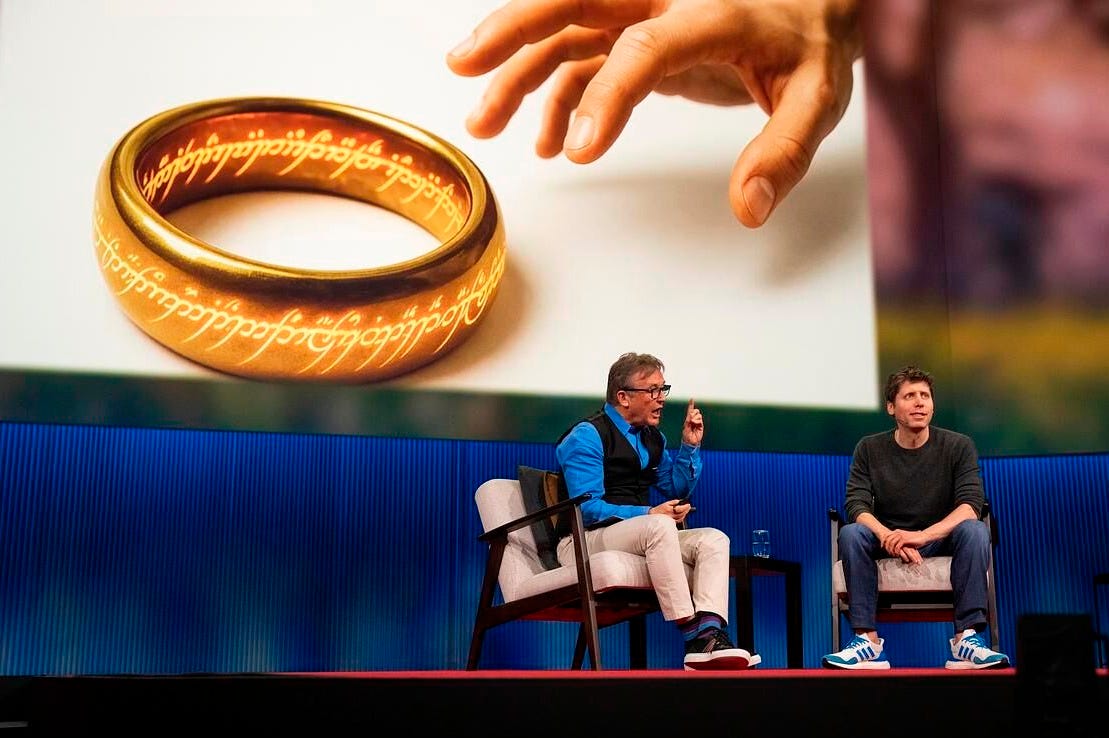"Who granted you the moral authority to shape humanity's destiny, and how are you personally accountable if you're wrong?"
This piercing question wasn't posed by a philosopher—ChatGPT generated it for Chris Anderson (head of TED) to ask Sam Altman (Founder/CEO of OpenAI) during their interview at the TED conference last month.
Ironically (or, perfectly?!) artificial intelligence had articulated the very wisdom gap its creators are struggling to bridge.
Watching their exchange, what struck me wasn't Sam's brilliance, but his dance around accountability. When pressed on moral authority, his exasperation was palpable: "You've been asking me versions of this for the last half hour."
The conversation highlighted a defining paradox: we're entrusting our future to technically-gifted humans who lack the wisdom their power demands. As the AI race accelerates, this wisdom gap widens.
I left feeling the queasy unease I experienced years ago watching Elon Musk on that same stage. Brilliance? Undeniable. Moral compass? Unclear.
My friend Aarthi calls this phenomenon "amoral ambition" – the relentless pursuit of goals untethered from ethics. Once you see it somewhere (often behind a dazzling veneer of confidence and charisma) you see it everywhere.
I first encountered it my freshman year at Stanford, when a dormmate declared over dinner: "I know I'll be famous or infamous; I don’t care which."
Years later at Harvard Business School, I'd stare at the mission statement prominently displayed in every classroom: "Educating leaders who make a difference in the world." To this day the official sentence remains silent on what kind of difference.
Amoral ambition is more insidious than the immoral variety. While immorality recognizes ethical boundaries and deliberately crosses them, amorality has no parameters at all. It’s simply the relentless pursuit of MORE – power, profit, personal gain.
Rutger Bregman's new book, Moral Ambition, suggests we simply need to "take the ambition of a careerist and add a dash of idealism." But a dash isn't enough — the pitfalls of well-intended (but ineffective) altruism are all around us. Morality isn't an add-on; it's an orientation. Ultimately, the how IS the what.
The real antidote to ambition without a compass? Wisdom.
As artificial intelligence becomes ubiquitous, authentic intelligence becomes our most precious resource. The wisdom we need doesn't require more compute power – it emerges from our innate capacities as humans.
Wisdom goes deeper than intelligence – it’s knowledge that lives in our bodies, not just our brains. It thrives in paradox and flourishes in the space between certainties.
How do we learn it? "It's a matter of wisdom resonating with wisdom," writes Pema Chödrön, whose words I turn to every morning to remember what I already know but often forget.
We recover our wisdom by getting quiet enough to hear what lives beneath words. By sitting with discomfort without escaping into distraction. By remembering the essential truth that between stimulus and response lies our greatest gift: the power to choose.
As long as we accumulate knowledge faster than we cultivate wisdom, the wisdom gap — the chasm between what we can do and what we should do — will continue to widen. Closing the gap is our existential challenge.
This is precisely why Chalon Bridges and I founded the The Flight School — originally conceived as a “Wisdom School” — to help the rising generation learn what can't be taught in classrooms or textbooks alone.
In June 2024 we launched a pilot with Fellows from 16 countries – diverse high school graduates who had excelled by traditional metrics, but hungered for more: namely, deeper meaning and a higher purpose. The impact has been profound: 100% report transformative experiences. (According to Gallup just 3% of college graduates say the same).
Our Fellows spend a ‘launch year’ tuning into their innate wisdom by exploring — and living — life’s essential questions:
Relationships beyond the surface: How do we foster authenticity, connection and trust?
Learning beyond textbooks: What kindles - and dwindles - our inner light?
Travel beyond tourism: How does stepping into our stretch zone—and staying there—transform who we become?
Life beyond tech: How can stillness, nature and contemplative practice reshape our digital lives?
These experiences cultivate the wisdom that keeps us human in a world becoming less so:
Intuition to discern what’s true
Compassion for our shared humanity
Courage to create a world that works for all of us
Our vision? To scale this approach to the size of a generation.
In an age defined by amoral ambition, the most revolutionary act isn't shouting louder – it's uncovering the wisdom that algorithms can’t replicate. Our calling isn’t to compete with machines, but to unleash what’s uniquely human — tempering decisiveness with discernment, hubris with humility and blind progress with moral imagination.
Smarts might get us to Mars, but wisdom preserves the planet we already have.
Each of us is already an ancestor. The question is: what kind will we be? One who chased achievement without an ethical anchor, or one who helped build a world worth inheriting?
Wisdom isn't a nice-to-have virtue; it's our survival strategy.
I’m all in. Are you?







wow love the insights the words you use touches me so deeply thank you for sharing Abby !
Bravo, Abbey, once again your clarity illuminates and guides us forwards. I've often thought of the present situation as being a matter of balance between contemplation and action. Contemplation without action, and nothing outside our sphere of personal understanding is affected. We sit, mindfully no doubt, alone in our cave. Action with no contemplation and we join the mob, we we pick up spears for next Crusade. Bless you and The Flight School!